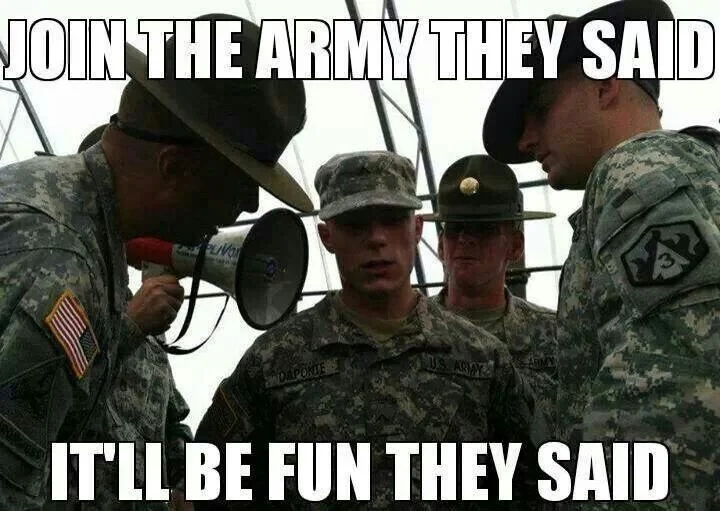They is the most corrosive word in business. It suggests there is actually a fundamental split in the team. A division between people, departments, functions, projects, and ultimately goals. They kills team unity and shirks responsibility.
I remember this repeated conversation I would have with young Soldiers when I was in the Army, most often when I caught them doing something wrong. I had it so often that I called it the “They and The Sergeant” conversation. It would go something like this:
“Who told you that you could miss formation?” (me)
“They did, Sergeant.” (Soldier)
“Who the f#*k is they!?” (me)
“The guys. They said The Sergeant said it was ok.” (Soldier)
“WHICH, Sergeant!? Who specifically?” (me again)
Blank stares.
“Who the f#*k are they and The Sergeant!? Somebody bring me They and The Sergeant!”
I think about that dialogue often, working with partners when they creeps into the conversation. “They decided we would do this. Their plan is that they changed course here, and they don’t want us there. And I’m quick to ask, “Who is they?” (absent the expletive…well, most of the time). And though the blank stares remain, those stares are nearly always accompanied by the slow head nods and smiles of insight.
Who is they?!?
“Who is they?” The question is just as useful in business as it was in uniform. Genuinely, we find that many leaders aren’t quite sure how they crept so strongly into the vernacular.
Sometimes it’s a sticky remnant of the “way it used to be.” The old paradigm of automaton business roles where the Execs cloister in high glass towers while the peons labor on factory floors. Though this isn’t the 1950s, and the leaders we serve never touched a tower nor wished for one, the tone oddly persists throughout business.
Sometimes, they emerges because leaders and their teams are so far from the strategy they are merely tenants of the plan instead of owners. In this occasion, it’s hard for their plan to feel like our plan, particularly when that plan fails to account for our known limitations.
Sometimes, we don’t know just how much we are they. This happens often in young leaders who are making the move from being a part of the team to leading the team. We serve a lot of emerging leaders and newly appointed leaders, and this presents the very real challenge of leading peers and former peers. In these moments, we find it helpful to ask a different question, “You know we are they now, right?” And yes, we do know that. And yes, it’s still new and different enough that it takes some effort to make that switch. That is normal.
And still, other reasons abound, like making excuses. Just like those young Soldiers all those years ago who knew what time formation was and chose to miss it. Sometimes they gets thrown out in a feeble attempt to shift accountability. Because if we’re really being honest, even if we didn’t get a chance to make the plan or inform the plan, we still are responsible for our execution and our results. That’s part of being a professional and, candidly, an adult.
We’ve found that making the switch from they to we makes a big difference. When we replace they with we, we create more than a silly syntax switch or a patronizing platitude. Leaders who intentionally replace they with we are extending ownership to the team. We are making a subtle, yet significant statement that we are in this together. We own the plan. We own the problem. We own the goal. We own the results. And while this doesn’t replace the fact that, as leaders, we are responsible for the ultimate outcome, it does extend agency to our teammates who show up every day and invest in the mission. And it allows us all to experience what matters most about all of this when it really comes down to it - our purpose.
I was reminded of this last week on a call with one of our partners. Our teammate, Sarah, aka “The Glue,” has been a colleague and friend for eight years now. We served together at Team RWB and again here at ALPs. Sarah has a way of subtly dropping insight bombs when you’re not looking. I shared an insight Sarah taught me many years ago with our partners. She told me, “We all know you have our backs, and you take on so much. We know you trust us. We also see the toll it takes on you and would value you sharing more of the load with us.”
Sarah smiled last week, and added, “Sharing the load allows us also to share the responsibility. We also get to feel responsible. We need to feel that.”
That’s it right there. When they have a plan, we’re renting the plan. When we have a plan, we own the plan. We feel responsible because we are responsible. And when we are responsible, we don’t check out on the process, the effort, or the results. We don’t point fingers at others because we know we are merely pointing them at ourselves. We don’t make excuses, we make corrections.
And we don’t use vague theys or conjure up imaginary The Sergeants when we miss the mark. Because they and the Sergeant (by any other name) are just as much bullshit in business as they were in uniform. And because we are professionals who own our teams and our missions.




